
- Home
- About Us
- Sustainability
- Investors
- News
- People & Culture
-
Regions
18 – 23 September 2022
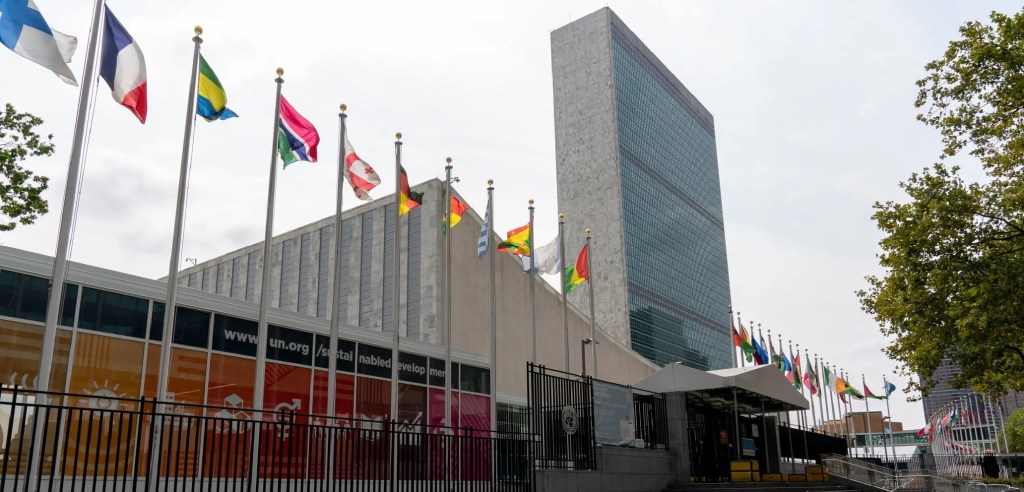
World leaders gathered in New York City recently for the United Nations General Assembly (UNGA). MTN participated in a range of UNGA-related engagements as part of our commitment to collaborate with international organisations to achieve collective solutions to the world’s most pressing challenges.
Overview
Africa has staked its claim as the cornerstone of the world’s future – this was the recurring message during UNGA 2022. The continent is positioned to be the most important driver of global business with a $2.5 trillion market opportunity.
As a pan-African company firmly invested in the success of the continent, MTN Group participated in a series of UNGA platforms. This is aligned to our strategic intent of leading digital solutions for Africa’s progress. Here are our reflections on the various platforms in which we participated and areas we covered during UNGA 2022:
Accelerating broadband access for new realities
In 2010, the ITU and UNESCO set up the Broadband Commission for Sustainable Development in response to then UN Secretary-General Ban Ki-Moon’s call to step up UN efforts to meet the Millennium Development Goals (MDGs). The commission was established to boost the importance of broadband on the international policy agenda and expand broadband access in every country.
The release of the 2022 State of Broadband report at the Annual Fall Meeting of the Broadband Commission for Sustainable Development brought to the fore the realities that both the world and the continent face. In 2020, the first year of the pandemic, the number of internet users grew by more than 11%. In low- and middle-income countries internet use went up by 15%.
The pandemic also shone a light on the barriers to being connected and on four barriers in particular: a lack of skills; a lack of access; a lack of devices; and a lack of the means to pay for them. These barriers make it impossible for millions of people to access services and to work or learn from home.
The need to make broadband more affordable remains important and must move towards < 2% of monthly gross income. It is also essential that countries adopt practices and policies that incentivise more affordable services, subsidise access to free or low-priced devices and provide free connection in libraries, hospitals, schools and at other public hot spots. We acknowledge the need to collaborate as there is still much work ahead to drive digital inclusion across Africa.

MTN Group President and CEO Ralph Mupita is a commissioner of the Broadband Commission for Sustainable Development.
Global Africa Business Initiative: Together we will make Africa Unstoppable
The United Nations Global Compact in conjunction with African leaders hosted the first Global Africa Business Initiative (GABI) on the sidelines of UNGA, highlighting opportunities on the continent where all economic sectors are on a growth trajectory.
There was resounding agreement of the importance of new and dynamic financing models, bold partnerships, easier trade across borders, the full participation of women, a pursuit of climate justice, and investment in renewable energy. Additionally, the emergence of Africa’s creative and cultural industry, technology invention and adoption, and agricultural transformation are all areas the continent must continue to support and elevate.
MTN participated in the GABI with fellow Africans who are passionate and committed to contributing to the continent’s progress. We agreed that there is significant work to be done to drive digital inclusion across the continent. Network coverage is not the real problem anymore and some of the issues that need to be resolved before the end of 2025 include:

MTN Group President and CEO Ralph Mupita alongside Rwandan Minister of Information Communication Technology and Innovation H.E. Paula Ingabire and other dignitaries speaking on the digital transformation of Africa at the Global Africa Business Initiative.
UN HeforShe Summit: Acting now to drive action on Gender Equality
A rallying call to all men to act now to drive action on gender equality was made by UN Women at the annual HeForShe Summit. According to the World Economic Forum, at the current pace it will take hundreds of years to achieve gender equality and equal rights for women. This is a stark reminder that work to make gender equality a reality is both a business and societal imperative.
Men still hold about 80% of key decision-making positions and therefore must play a key role in achieving gender equality. There is overall acknowledgement of the need to recognise the causes of gender inequality, and even though the pursuit of gender inequality varies from one country to another, the root causes of discrimination and inequality are the same across every part of society.
As a company, we are clear that a diverse and inclusive culture is critical to our success and sustainability. It’s the reason we are working to achieve gender equity by 2030; driving higher representation of women within technology roles with a goal of 30% by 2030; and closing gender pay gaps across our businesses.

MTN Group President and CEO Ralph Mupita, Senior Vice President for Markets Ebenezer Twum Asante, Group Chief Sustainability and Corporate Affairs Officer Nompilo Morafo and Group Chief Human Resources Officer Paul Norman with Anita Bhatia, UN Women’s Deputy Executive Director for UN Coordination, Partnerships, Resources and Sustainability.
Various stakeholder engagements
Ghana navigated the COVID-19 pandemic crisis well, emerging in a position of comparative strength with the economy forecast to expand by 6.2% in 2022, according to the IMF. Telecommunications is one of Ghana’s main economic sectors thanks to the country’s liberal information and communications technology (ICT) policies.
The MTN Group delegation led by MTN Group President and CEO Ralph Mupita paid a courtesy visit to H.E. President of Ghana Nana Akufo-Addo on the sidelines of the UNGA meetings. They discussed various issues related to global macroeconomic developments and the impact on African countries; developments in the telecommunications sector including rural broadband coverage; as well as progress with MTN Ghana’s localisation plans. MTN Ghana is MTN Group’s third largest operation, contributing more than 10% to MTN Group service revenue.

Group President and CEO Ralph Mupita, Senior Vice President for Markets Ebenezer Twum Asante and Chief Sustainability and Corporate Affairs Officer Nompilo Morafo with H.E. President of Ghana Nana Akufo-Addo.
Other various stakeholder engagements
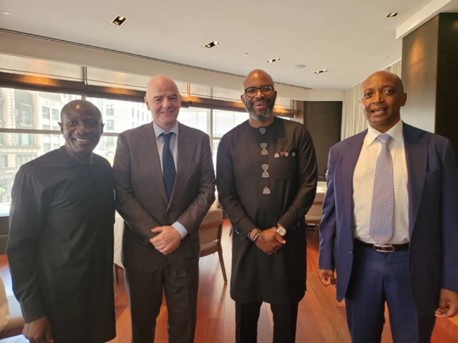
MTN Group President and CEO Ralph Mupita and Senior Vice President for Markets Ebenezer Twum Asante catching up with FIFA President Gianni Infantino and CAF President Patrice Motsepe on the power of African football in giving people hope, dignity and opportunity.

MTN Group President and CEO Ralph Mupita, Econet Founder & Executive Chairman Strive Masiyiwa, Google-Alphabet Senior Vice President James Manyika and other key stakeholders at the Global Africa Business Initiative meeting where they reflected on changing economic realities and opportunities in Africa.
Back to UNGA
Described as a ‘watershed moment’, UNGA was the first in-person meeting of world leaders since the pandemic and highlighted a series of issues particularly for Africa. African Union Chair and Senegalese President H.E. Macky Sall described the war in Ukraine as having as ‘put Africa in real danger’.
The Assembly was a chance for Africa to make its voice heard, with a series of demands such as better representation for Africa on the UN Security Council, better treatment for African countries from credit rating agencies, and more autonomy to exploit oil and gas reserves, alongside commitments to the Paris Agreement. Africa requires $2.8 trillion between 2020 – 2030 to implement its Nationally Determined Contributions under the Paris Agreement, but annual climate finance flows stand at only $30 billion.
Compiled by Nompilo Morafo
MTN Group Chief Sustainability and Corporate Affairs Officer
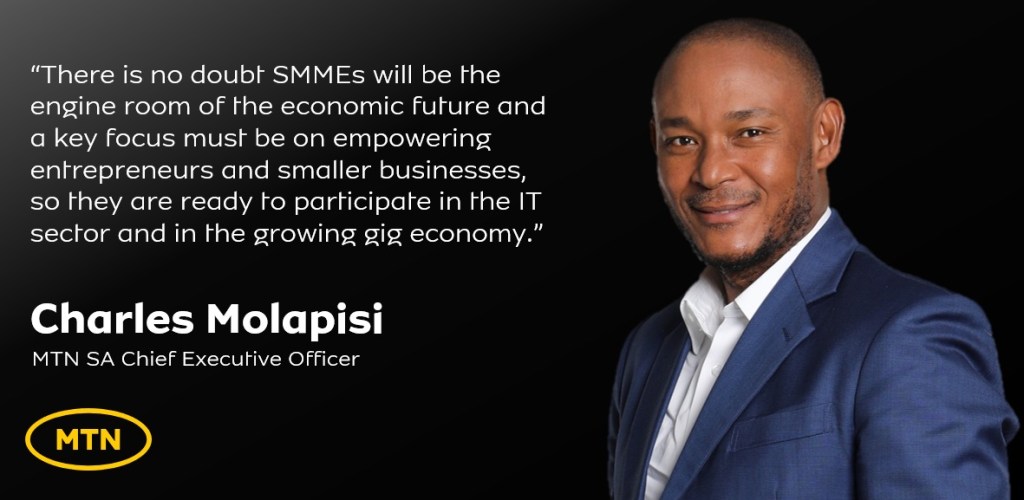
MTN SA believes that the power of technology is the key to unlocking South Africa’s potential and creating jobs and opportunities. This comes as billions of online connections every day between people, devices and products rapidly reshapes the future of business, opening the door to many opportunities. Understanding and adapting to these trends, re-skilling, up-skilling and being more innovative is now more critical than ever.
There is no doubt SMMEs will be the engine room of the economic future and a key focus must be on empowering entrepreneurs and smaller businesses so they are ready to participate in the IT sector and in the growing gig economy. Small and medium business growth will be the spark to ignite and accelerate growth closer to 5% and at MTN we want to support this at every step by being a true partner. We want to help those who do business to do it better and smarter, as we build an economy that harnesses the benefits of the modern, connected world.
Increasing economic growth will however require business and labour to endorse a shared vision. SA has the talent, but the private and public sectors need to ensure it is supported more broadly to enable success on all fronts. This will also require the private sector to play a bigger role as an incubator for skills (including businesses in value chains) and strengthened financial services to help increase access for SMMES to more effective innovations and solutions.
South Africa’s National Development Plan makes an important nod in this direction. It says the country has the potential to create 11 million jobs by 2030 – but acknowledges the need for better policies, more public-private sector partnerships, up-skilling and higher competition, among others. The role of SMMES features strongly in these plans, with employment scenarios suggesting that most new jobs are likely to be sourced in domestic-orientated businesses, and in growing small- and medium-sized firms. While most jobs are not created directly in exporting firms, the plan acknowledges that sectors that are globally traded tend to have more potential to stimulate domestic spin-offs. It is clear to me that the digital economy needs to feature far more strongly in these discussions and plans in future if we are to reach these targets and accelerate growth.
A good example of these partnerships and commitment to growth and SMME support in action is MTN SA Foundation’s ongoing support of digital entrepreneurs. It is amazing to see the partnership between the Foundation, Hodisang Dipeu Holdings, the University of the Free State and the Datacomb Development Hub, for instance, grow from supporting 60 SMMEs to 100 SMMEs benefitting from the programme in 2021. We want to grow this even further in future and it is only one of many ways we are driving support for entrepreneurs, consumers and businesses across our value chain.
Clearly, a bright future lies ahead for those who can harness the digital opportunity the fastest as the digital economy continues to grow at a rapid rate in SA and across Africa. Just consider the upside for a minute – while it took nearly a decade for the mobile industry to reach its first 100 million monthly active accounts, it has taken just over five years to reach another 200 million and Africa – led by Sub-Saharan Africa – is leading the way.
Today, Africa’s mobile service subscription figures are skyrocketing, with 615 million users in sub-Saharan Africa expected to subscribe to mobile services by 2025, according to the GSMA. This presents an immense opportunity and is testament to Africa’s potential and capacity. In fact, Africa is increasingly a place where innovation begins in the tech space. There were, for instance, more investment rounds for African tech start-ups last year than ever before. Now that COVID-19 subsides, we can expect even more in the year ahead.
The recent GSMA State of the Industry Report on Mobile Money for 2021 shows that the recent growth trend remains firmly in place. It highlights that in low- to middle-income countries, mobile money is now far more accessible than any other type of digital financial service (including app-based platforms), particularly outside urban centres. Southern Africa grew the fastest at 24% year on year. Notably, the value of mobile money merchant payments grew by 43% compared to 28% in the previous year.
Businesses, however, need to adapt to stay ahead and ensure they can meet the growing needs of their customers, who expect to be dealing with tech-savvy, modern and digitally thinking operations. MTN understands these trends and aims to continue building and innovating to support the growth of SMMEs.
A wonderful opportunity lies on our doorstep, but there is no time for delay. We must act with speed and purpose to contribute value to the Fourth Industrial Revolution. If we don’t, Africa will be behind the tech curve and it will not be able to enjoy the benefits of this exceptional time of global change.
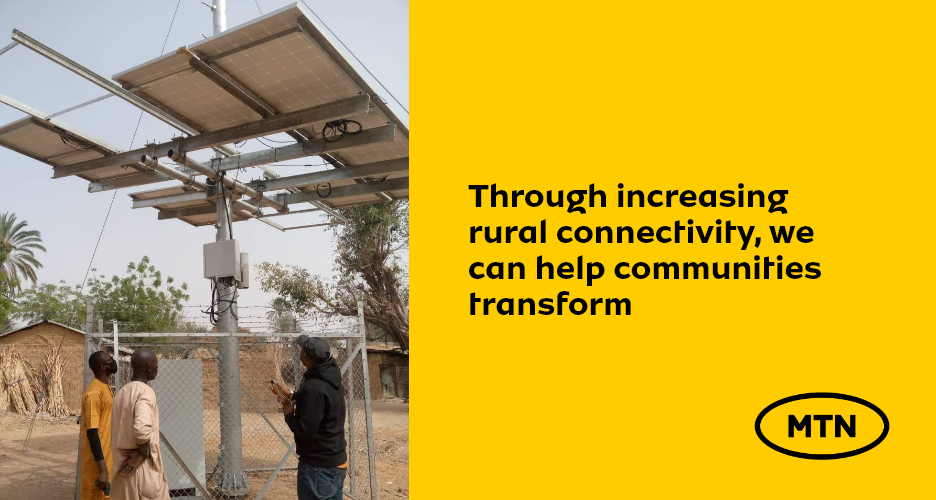
At MTN we recognise our incredible responsibility to ensure that no one is left behind in the profound evolution to a digital future. We know that access to affordable communication has the power to change lives and bridge inequalities and this is why we focus on increasing access – particularly in rural areas – and reducing the cost of our voice and data services.
The COVID-19 pandemic and the associated lockdowns clearly showed that internet affordability and accessibility are key enablers for communities, governments and businesses. Yet, several barriers to mobile internet adoption exist. We work to address these through our industry-renowned ‘CHASE’ framework, focusing on coverage, handsets, affordability, service bundling and education and ease of access.
Coverage is key, and in 2021, we rolled out 912 new rural towers (after rolling out 684 in 2020). This extended rural broadband coverage to a total of more than 23 million people across our markets, from 8.5 million in 2020. It brought MTN’s total rural broadband coverage to 83% and compares to our target of 95% by 2025.
To ensure that we meet this target, for 2022 we linked the incentives for executive remuneration to the progress we achieve on three ESG measures, including the expansion of rural broadband.
“Through our rural connectivity programme, 23 million people can now use their smartphones to access information and learning tools,” said Amith Maharaj, Executive for Network Design & Planning at MTN Group. “This programme is also accelerating the drive towards financial inclusion, where those previously considered as ‘unbanked’ are able to use the new infrastructure to make financial transactions.”
The impact has extended to entrepreneurs who can now run their businesses using the power of the internet.
Closing the coverage gap in rural areas would not be possible without the collaboration of our partners, who help us overcome challenges, most of which originate in our supply chain. In 2021, we increased the number of rollout partners as well as the kinds of partnership models in place.
We also use new technologies to find coverage solutions. OpenRAN (radio access network) enables us to cost-effectively develop and install 2G to 5G networks in previously unconnected areas.
Through our circular economy practices, we also reuse 3G equipment – often in rural areas – when it is swapped out for 5G equipment in those places where we have 5G spectrum. By doing this, we reduce the cost of these technologies while avoiding the emissions associated with the equipment’s manufacture, part of our work to reach Net Zero by 2040.
Equipment swaps take place within countries, or even between our different operating companies. Therefore, we need to collaborate closely with our partners to ensure that we adhere to trade rules and regulations around the sales of network equipment such as radio antennas. We also work with our partners to create an environment where circular economy initiatives become the norm.
MTN’s belief is that everyone deserves the benefits of a modern connected life. Through increasing rural connectivity, we can help communities transform. Access to information can reduce poverty by educating and upskilling the youth, creating jobs and improving lives. This fits with our Ambition 2025 strategic intent: Leading digital solutions for Africa’s progress.

People who are connected are ultimately empowered. It follows that the digital inclusion of traditionally marginalised groups – those in rural areas, as well as the elderly, women and the youth – is a key to broader socioeconomic development.
Driven to deliver on our strategic intent – Ambition 2025: Leading digital solutions for Africa’s progress – MTN has a clear plan to ensure that everyone in our markets can enjoy the benefits of a modern connected life. We call this ‘CHASE’. Rolling out broadband coverage – the ‘c’ in CHASE – is the first step.
“Providing a quality broadband network is essential, but not enough: there are various other interventions required to make sure that no-one is left behind,” says MTN Group Consumer Executive Enzo Scarcella. “People also need 3G-enabled handsets; affordable data; relevant service offerings; as well as education to equip them with the skills to make the most of all that the mobile internet has to offer.”
When all these elements are in place, adoption increases sharply – a fact corroborated by the findings of a study in Zambia, where MTN’s partner AMN is helping us extend broadband connectivity to more people in rural areas. The research looked at the impact of various interventions in six ‘ultra-rural’ villages compared to a control group of another six villages, all with 3G networks.
It found that by implementing the interventions – which are aligned to each of the elements of MTN’s CHASE framework – more new users were brought on to the internet and their data usage increased significantly, to three times the amount recorded in the control villages.
“Studies such as these encourage us to keep pursuing our CHASE framework,” says Scarcella, adding that the Group was building on the good progress made in 2021, the details of which include:
Coverage: To ensure sufficient coverage in rural areas, in 2021 we increased the number of rollout partners and introduced new partnership models, rolling out 912 rural sites. This expanded coverage to more than 23 million people in rural areas, up from 8.5 million in 2020. By the end of 2021, MTN’s total broadband coverage was 83% of the population. Through MTN Global Connect, we continued to build the infrastructure to connect African countries to each other and the rest of the world. We rolled out more than 15 000km of terrestrial fibre, bringing our total footprint to 100 000km.
Handsets: To increase the affordability of and customer access to data-enabled devices, in 2021 we placed 3.1 million 3G and 4G devices in the hands of our customers. We increased the number of vendors from whom we procure handsets and with whom we have agreements, ensuring that customers can access after-sales service. We also offered an MTN-approved device that is 20% cheaper than a comparable handset. By partnering with M-KOPA, we supported device financing to customers in Uganda and Ghana. In 2022, we are extending this to Nigeria and Zambia.
Affordability: To increase data service affordability, in 2021 we reduced our effective data tariff by 15.3%. To test affordability in line with United Nations and ECOWAS guidelines, we benchmarked MTN data pricing across operations. We found that 11 MTN markets have data prices that are within the UN’s recommended affordability range.
Service bundling: To create service offerings that are relevant, simple and meaningful to customers, in 2021 we provided different customer groups with different propositions, tailoring our offerings to include microbundles, social media bundles and XtraByte – a service that allows customers to borrow data when they run out. We also introduced YouTube streaming bundles for entry-level users.
Education and ease of access: To enhance digital literacy and the ease with which data can be accessed, in 2021 we trained 24 million people in the 12 markets in which we offer our ‘MTN Data-Smart’ digital literacy programme. This zero-rated programme improves people’s basic understanding of the mobile internet and applications.
“CHASE clearly defines the work that we need to do, and helps keep everyone at MTN focused,” says Scarcella, adding that extending digital and financial inclusion across the African continent also supports the group’s strategic priority to create shared value. “No one must get left behind, regardless of their location, age or socio-economic standing.”
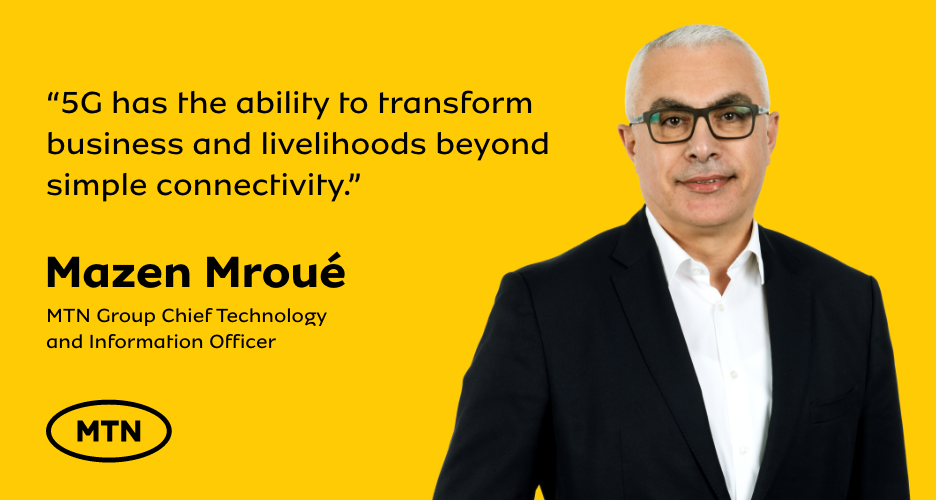
Mobile communications technology has been a crucial enabler of the information age, connecting individuals, businesses and governments, and facilitating improvements in daily life for people everywhere. Connectivity is the lifeline of modern societies and access to it is a digital human right.
Digital disruption is supporting economic development and the ambitions of the nation states in which MTN operates. According to a recent GSMA report, mid-band 5G will generate a $13 billion contribution to GDP in Sub-Saharan Africa by 2030. The rollout of 5G will help usher in the fourth industrial revolution and drive economic growth.
“5G is more than just an incremental upgrade from 4G. It delivers dramatically increased fibre-like broadband speeds compared to 4G, creating the potential for unlocking many new use cases for consumers and enterprises alike,” says Mazen Mroué, MTN Group Chief Information and Technology Officer.
“5G has the ability to transform business and livelihoods beyond simple connectivity. The key lies in the ultra-fast end-to-end communication capacity it enables,” he says, adding that it will enable many industries such as manufacturing, agriculture and mining to be more efficient.
“5G will also revolutionise the security and telematics industries as it allows a much larger number of devices to connect to telecoms networks at the same time.”
While developing countries have traditionally lagged developed ones in terms of readiness for and rollout of innovative technology, with the advent of 5G, both developed and developing countries are advancing simultaneously. Even markets where 4G is yet to mature are embracing 5G.
Modern base stations can switch dynamically between different technologies. Customers with capable handsets can experience the magic of 5G as soon as it becomes available, while customers with older handsets can continue to connect to older technologies on the same base station.
At MTN, we are driven to deliver on our purpose, which is to enable the benefits of a modern connected life to everyone. Back in 2018, we completed Africa’s first ultra-low latency 5G network indoor and outdoor trials. We did this in South Africa, where we launched commercial 5G services in June 2020.
MTN South Africa now has more than 1 000 5G sites across several spectrum bands, with plans to significantly scale this up since we procured high-demand spectrum in a landmark auction in March 2022.
MTN Nigeria also secured, via auction, spectrum for the deployment of 5G in 2022, and in December 2021, MTN Côte d’Ivoire launched 5G trials.
Authorities across Africa see the value of adopting 5G. In 2021, regulators in Uganda and Zambia conducted consultations on 5G spectrum, paving the way for 5G deployment. Markets such as eSwatini, Cameroon and Côte d’Ivoire also displayed movement in terms of discussions around securing 5G spectrum.
Since 2020, demand for broadband services has surged, with work from home during COVID-19-related lockdowns accelerating adoption everywhere. In 2020, MTN’s data traffic increased by a dramatic 110%. In 2021, it expanded by a further 58.3%.
Not wanting to leave anyone behind, MTN Group is ramping up its rollout of 5G sites. In 2021, across the Group, we rolled out 849 5G radio sites. Over the medium term, we aim to reach 5G population coverage of 10%-30%.
But to provide faster speeds and capacity and contribute to the realisation of the African digital transformation agenda, we need adequate, suitable, affordable and harmonised spectrum to fuel our networks.
To advance this cause, we advocate for recognition and accommodation in terms of our spectrum requirements and to ensure Africa’s recognition in the 5G space at international forums, including the GSMA’s Strategic Spectrum Management Group, Future Spectrum Group and Future of Spectrum Access.
As our Group President and CEO Ralph Mupita has said, “Africa will surprise on 5G.” The continent stands at the cusp of 5G mass markets deployments. Never has a technology been so eagerly anticipated.
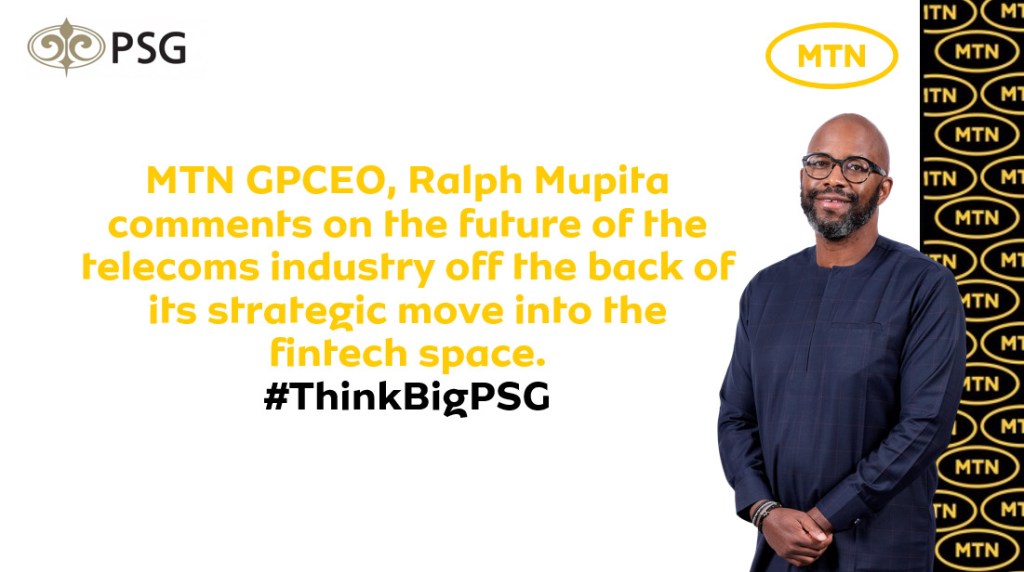
‘The days of having a 4-6 player telecoms market on the continent are coming to a swift end.’
26 April 2022: Late March saw leading African telecommunications network provider, MTN overtaking rival, M-Pesa to become the continent’s largest mobile payments provider. In addition, the MTN Group is in the process of spinning off its fintech division separately andwill be looking to bring in strategic investors into the group fintech business to bolster its expansion in the fintech space. This strategic shift of focus is indicative of the Group’s broader objective to consolidate its business model and move decisively towards solidifying its position as a truly pan-African company. As a brand, its eye is firmly set on existing and new African horizons, in what can be thought of as a “third chapter” in MTN’s business evolution.
This was the perspective shared by Ralph Mupita, President and CEO of the MTN Group, who engaged in a conversation about the future of the telecommunications industry with award-winning journalist, Bruce Whitfield. The discussion formed part of a webinar entitled Think Big– a digital series that gleans insights from some of the country’s most informed thought leaders and prominent public figures. The Think Big series is an initiative of leading financial services group, PSG, and is geared towards providing a freely accessible South African platform for debating and discussing some of the country’s most pressing issues.
Furthering his point on MTN’s single-minded focus on the African continent, Mupita confirmed that the Group has dialed back its interests in the Middle East in order to simplify the Group’s operations and allocate its human and capital resources in a way that leverages the opportunities that exist on the continent and produces profitable returns in the long-term.
With a background in the financial services sector, Mupita has played an instrumental role in the brand’s expansion into mobile money and insurance. And while the move into this new space is backed by a strong business case, for Mupita, the bigger picture is that “we cannot leave people behind. We are very determined to deepen digital and financial inclusion across Africa. Africa has an opportunity to leap-frog economically by leveraging digital infrastructure and services to drive social-economic growth. We have seen the positive impact that mobile money has made in countries like Ghana and Uganda and we believe that by expanding into this area, we can create a win-win environment for business and for broader African society. We see a similar opportunity in a market like Nigeria, now that we have a Payments Services Banking licence, where we will commence operations soon.”
Commenting on these developments, Mupita said that, “MTN is entering a ‘third chapter,’ of growth. In its formative years post-democracy, the Group established itself as a voice-centered network and expanded into new markets such as Rwanda and Uganda. In its ‘second chapter,’ around 2008, it transitioned into the data services space, driven by the emergence of smartphones. Now, as the Group enters a new stage of development, where ecosystems and platforms will drive growth, MTN is steadfast in its plans to make inroads into the financial services industry towards the ultimate goal of promoting and driving financial inclusivity on the continent.
Reflecting on the Group’s journey over the past two years, Whitfield suggested that although the pandemic bore catastrophic consequences for South Africans (and Africans at large), its outbreak was fortuitous in the sense that digital technology was well-positioned to serve as an enabler for change.
Mupita agreed with this sentiment, commenting that at the time of the Covid-19 outbreak, MTN was equipped with the capital and infrastructural resources it needed to weather the storm and deal with the unprecedented surge in network traffic. For the Group, the past two years has been about building and maintaining a telecoms environment that could help Africans to sustain a semblance of normality, while also ensuring that the Group’s financial position remained strong.
Post-pandemic, Mupita has become a proponent of having mature conversations with stakeholders and other industry players about the future of telecoms on the continent. Referencing the American current state of affairs as a model for what lies ahead for Africa, Mupita made the bold statement that “consolidation is inevitable.” In his opinion, what this means is that the days of having a 4 to 6 player telecoms market on the continent are coming to a swift end.
As he elaborates: “Having a market that is saturated by a number of players is not sustainable. There is simply not a big enough profit pool to meet the return and other financial objectives of a number of industry players. Within the next few years, we will see a sector dominated by 2 to 3 major players who have the capabilities and capacity to rally massive amounts of capital investment locally and abroad, to sustain the industry’s expansion. MTN has every intention of being one of the scale operators in all its markets.”
On the emergence of 5G technology, Mupita commented that the ‘Elon Musk dream’ is well within our reach. Essentially, 5G entails machine-to-machine communication, and examples of this are already in existence in the mining sector, where MTN has played a key role with partners in the development of driverless vehicles in open-cast mining pits in South Africa.
As he suggests, “driverless vehicles for consumers may not be such a far-off reality. We’re seeing use cases developing for 5G for mining, ports, manufacturing and other industrial applications around the continent. As we continue to invest in the development of African infrastructure for African society, we see MTN making a significant contribution to these kinds of new digital technologies. Africa will surprise on 5G.”
From the discussion it seems clear that there are many growth opportunities available on the African continent. With a long runway ahead of it, these developments re-emphasise the importance of sound financial advice and effective wealth management for investors who want to position themselves strategically to drive growth on the continent and ultimately, reap the benefits.
To watch the webinar, please click here
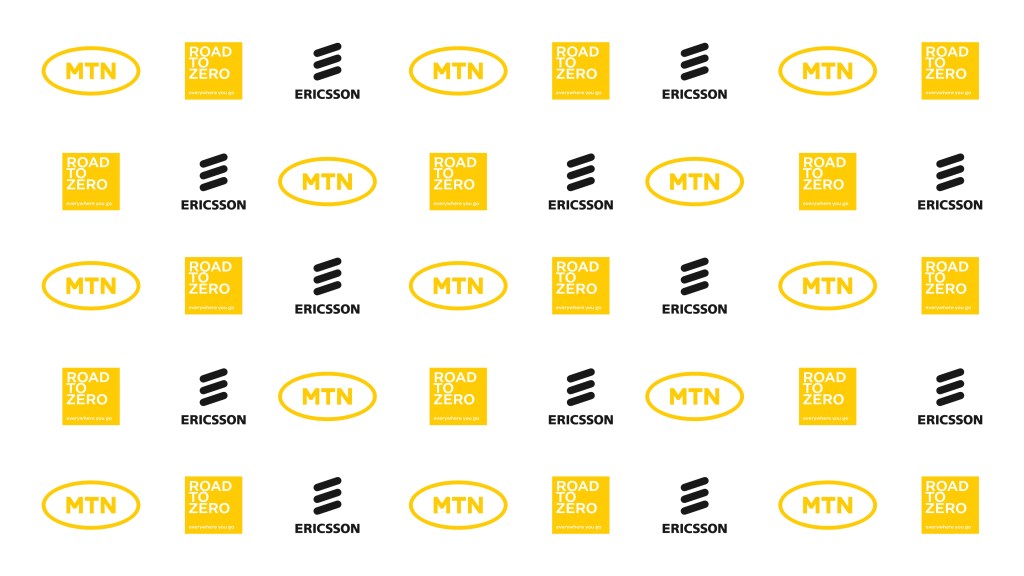
Ericsson (NASDAQ:ERIC) has joined MTN in pledging to commit to a Road to Zero strategy and committing to realising a Net Zero carbon emission future by 2040. MTN has called on partners including Ericsson to work together to setting science-based targets to reach a Net Zero future together.
A key aspect of MTN Group’s Ambition 2025 strategy is to create shared value in a sustainable manner through responsible Environmental, Social and Governance (ESG) practices. By leveraging Ericsson’s latest and most advanced sustainable technologies, MTN will be in a better position to realize its energy use and carbon management efforts in line with its commitment to reach Net Zero emissions by 2040.
Climate action is imperative to secure future socio-economic development in Africa., This initiative will see MTN and Ericsson work together to support economic growth and development in an environmentally responsible way. Through the pledge, Ericsson and MTN will also support several UN Sustainable Development Goals and play an important role in helping realize the 1.5-degree global warming goal set by the United Nations Framework Convention on Climate Change (UNFCCC).
Nicolas Blixell, Vice President, and Head of Global Customer Unit at Ericsson Middle East and Africa says: “At Ericsson, we strive for collaboration in everything we do. Understanding that we cannot achieve a Net Zero world alone, we endeavor to form strategic partnerships across sectors, industries, and markets. By signing this pledge with MTN and collaborating to provision our advanced sustainable cellular technologies, we are demonstrating our commitment towards forming partnerships where limitless connectivity improves lives, redefines business and pioneers a sustainable future.”
Nompilo Morafo, MTN Group Chief Sustainability & Corporate Affairs Officer said: “It’s about doing for tomorrow, today – realizing a Net Zero future is critical to our commitments towards sustainability, and we know that we can only realise our ambition through collaboration with our partners. With Ericsson joining our pledge, we hope to inspire our other partners, the telecommunications industry and other stakeholders to take meaningful steps towards decarbonization.”
The shift towards sustainability requires examining how we use resources. Currently, only 8.6 per cent of the material we use forms part of the circular economy. This means less than 10 per cent of the material used in the world in a year is recycled or reused in some way. Ericsson has also pledged to contribute towards MTN’s circular economy, which is an imperative part of the Road to Zero pledge aimed at driving Reducing, Reusing and Recycling of equipment.
Being a sustainability pioneer in the telecom industry for many decades, Ericsson has continually focused efforts on enhancing the circular economy and realising climate action goals. As a member of the 1.5°C Supply Chain Leaders initiative, Ericsson is also driving exponential climate action across global supply chains, supporting net-zero goals and the pledge. Through its commitment to science-based climate goals spanning several operations across its value chain, reducing impact in its own operations and products in use, and in its continued investment in the circular economy through initiatives such as the product take-back and e-waste management programs, Ericsson remains determined to help the telecom sector leave a lighter environmental footprint on the planet.
MTN Group’s Procurement company, Global Sourcing and Supply Chain (GSSC) received the ‘Best Use of Digital Technology’ award at the CIPS Middle East Excellence in Procurement 2022 Awards. The conference is the largest procurement gathering in the region, bringing together the industry’s most influential individuals.

The award recognises procurement and supply chain teams and showcases successful technology projects that have made a significant business impact in the industry. To this end, the award demonstrates how MTN GSSC is embracing of digital transformation in line with its vision to build a data-driven predictive procurement ecosystem.
MTN Group Chief Financial Officer, Tsholo Molefe commented, “This award is testament to the continued delivery of the key aspects of our Ambition 2025 strategy which at its core is about how we will drive the business forward to take advantage of the digital acceleration trends. The introduction of innovation and digital transformation practices within our procurement processes, ensure that as a Group, we continue to identify and implement processes that are enabled and driven by technological advances. A huge congratulations to the whole team on this achievement”.
MTN Group Executive for Procurement & Supply Chain Management, Dirk Karl who accepted the award commented, “It is a great pleasure to receive the prestigious CIPS award and to be recognised for our continuous efforts and achievements as well as our focus on utilising cutting-edge technologies and data management in both strategic and operational procurement. From telco to techco, that has been our ambition from the outset. We are not simply surviving the disruptive changes in the industry but changing our organisations DNA.”
Commenting on the gathering of the CIPS Middle East Excellence in Procurement Conference, Karl added, “It was great to discuss the latest and greatest advances in procurement and technology with other attendees. Our doors are always open for collaboration with other organisations who want to tap into the future of procurement and benefit from the innovative ideas we are developing.”
With the new year still fresh, MTN GSSC has many more astounding advanced analytics developments on their 2022 Roadmap.
An MTN Group delegation led by President and Chief Executive Officer Ralph Mupita has concluded a visit to the WECA region, where meetings were held with key stakeholders in Cameroon, Benin and Ghana.
The visit is in line with MTN’s commitment to open and regular dialogue with local authorities in our markets as well as our work to create shared value and engage on developments related to digital and financial inclusion. Among other members of the delegation were MTN Group Senior Vice President Markets Ebenezer Asante and Group Chief Fintech Officer Serigne Dioum.

During the visit, the MTN leadership noted the role that the Group updated stakeholders on the role MTN is playing in the development of the digital economy, regulatory developments as well as discussion on nation-state strategies for socio-economic developments in the respective markets.
The visit kicked off in Cameroon, where the Group President and CEO held meetings with several material stakeholders, including the Prime Minister, the Minister of State, the Secretary General of the Presidency of the Republic, and the Head of the Regulatory Board.
He congratulated the Government of Cameroon for hosting AFCON 2021: “AFCON 2021 successfully showcased the football talent of Africa, and demonstrates the importance of football as a unifying force across the continent. MTN has been increasing its involvement in football, with new sponsorships in Nigeria and Cameroon in recent times.”
Mupita was happy to see the good progress made on key regulatory matters in Cameroon, and expressed gratitude to the country’s authorities for their support.
In Benin, Mupita met the Minister of Economy and Finance, Senior Minister of State, and the President of the Regulatory Board ARCEP and his cabinet. He congratulated the government on the country’s economic growth as well as Benin’s progress in securing the return of historic cultural artefacts.
MTN is invested in promoting Benin and showcasing its rich culture through the campaign, #LeBéninQueJ’aime. At the Ministry of Health, Mupita announced MTN’s financing of a shipment of COVID-19 vaccines to Benin.
Mupita spoke about the Government Action Programme (PAG) particularly as it relates to the enhanced efforts towards access, and digital and financial inclusion, which aligns with MTN’s belief that everyone deserves the benefits of a modern connected life.
On the last leg of his tour, Mupita engaged with key stakeholders in Ghana. These included meetings with the Minister of Communications and Digitalisation and the Board Chairman and Director General of the NCA to reiterate MTN’s support for the further development of the Ghanaian telecommunications sector and Ghana’s broader digital economy plan.
The new policy is in line with the changing nature work accelerated by Covid-19.
MTN Group is pleased to announce the introduction of Anywhere, Anytime Flexibility, a new Group Policy that encourages time and place flexibility. Under the auspices of the Group’s future focussed “Live Inspired” employee value proposition that was introduced in 2021, Anywhere, Anytime Flexibility aims to better reflect the changing nature of the way we work. The policy enables qualifying employees with Anytime flexibility which relates to usage of business hours and Anywhere flexibility which relates to usage of workspaces.

Eligible employees have the option to opt-in for flexible work time and/or place of work, for specified durations during the week or month. This model has been built on the premise of creating a hybrid work environment which activates the benefits of working, both in a company structured and personal-choice environment.
Paul Norman, MTN Group Chief Human Resources Officer said, “Our goal is to create a happy and inspiring work environment for our employees. To this end, we aim to create a fair and inclusive culture which balances diverse personal choices and work priorities. Anywhere, Anytime Flexibility creates room for our employees to exercise the responsible choice of workplace and time to better balance work and life. This policy will also enable us to retain and recruit talented employees.”
The policy will be implemented in each MTN Group market in line with local laws and regulations. Importantly, the health and safety of our employees remains a priority, therefore the implementation of the policy will depend on the Covid-19 risk-adjusted health and safety clearance in these markets.